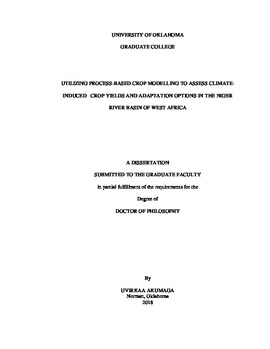| dc.description.abstract | This dissertation used the FAO AquaCrop model to evaluate the impact of climate change on major cereal yields and adaptation options in three agro-ecological zones of the Niger River Basin. The crops analysed include maize, millet, and sorghum under rainfed cultivation systems in various agro-ecological zones within the Niger Basin. This work also investigated several adaptation strategies, including changes in the sowing dates, soil nutrient status, and cultivar. Future climate change is estimated using nine ensemble bias-corrected climate model projection results under rcp4.5 and rcp8.5 emissions scenario at mid future time period, 2021/25-2050. The study also analyzed the projected changes in the intra-seasonal rainfall characteristics in the region. The study includes three self-contained but related studies; (1) Validation and testing of the FAO AquaCrop model under different levels of nitrogen fertilizer on rainfed maize in Nigeria, West Africa; (2) Utilizing Process-based Modelling to Assess the Impact of Climate Change on Crop Yields and Adaptation Options in the Niger River Basin, West Africa, and (3) Projected changes in intra-seasonal rainfall characteristics in the Niger River Basin, West Africa.
Broadly, the results of this study show that the AquaCrop model satisfactory simulated cereal yields at different nitrogen fertility levels in this region. The observed and simulated yields were evaluated to be satisfactory with a normalized root mean square error (NRMSE) between 8%-17% indicating excellent to good results for grain yield while the NRMSE for biomass yields were between 20-26% indicating good to satisfactory results. The results show that on average, temperature had a larger effect on crop yields so that the increase in precipitation could still be a net loss of crop yield. The simulated results showed that climate change effects on maize and sorghum yield will be mostly positive (2% to 6% increase) in the Southern Guinea savanna zone while at the Northern Guinea savanna zone it is mostly negative (2 to 20% decrease). The results also show that at the Sahelian zone the projected temperature and precipitation changes have little to no impacts on millet yield for the future time period, 2021/25-2050. In all agro-ecological zones, increasing soil fertility from poor fertility to moderate, near optimal and optimal level significantly reversed the negative yield change respectively by over 20%, 70% and 180% for moderate fertility, near optimal fertility, and optimal fertility. Thus, management or adaptation factors, such as soil fertility, had a much larger effect on crop yield than climatic change factors.
The results further show an increase of the average rainfall of about 5%, 10-20% and 10-15% for the Southern Guinea, Northern Guinea and Sahelian Zones respectively. On the other hand, there is a significant mean change of rainfall intensities and the frequency of rainfall at the low, heavy and extreme rainfall events in the Niger River Basin. The results showed an increase in the frequency of the moderate rainfall events in all locations in the basin. However, Samaru, at the Northern Guinea, and Tahoua, at the Sahel locations show an increase in the frequency of the heavy and extreme rainfall events in the future. These results revealed a delay of onset and a late cessation of rains and a significant decline in the duration of the growing season in all locations except for Samaru location in the Basin. Finally, this study projected that climate change poses serious risks for food security of the region and therefore demands adequate change in the cropping pattern and management to adapt to these changes. The results of this study provide an actionable decision support system that demonstrates how to evaluate strategies for improving cereals yield while mitigating and managing climate risks. | en_US |
